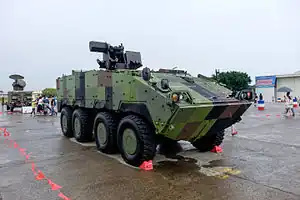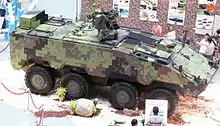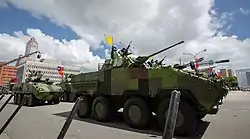CM-32 Armoured Vehicle
The CM-32 "Clouded Leopard" (Chinese: 雲豹裝甲車; pinyin: yúnbào zhuāngjiǎchē; lit. 'Cloud Leopard Armored Vehicle'), officially Taiwan Infantry Fighting Vehicle (TIFV), is an eight-wheeled armoured vehicle currently being produced for the Republic of China Army. It is based on the 6x6 CM-31 designed by Timoney Technology Limited of Ireland and is further developed by the Ordnance Readiness Development Center.[2]
| CM-32 | |
|---|---|
 CM-33 Armoured Vehicle | |
| Type | Armored fighting vehicle |
| Place of origin | Taiwan/Ireland |
| Production history | |
| Designer | Ordnance Readiness Development Center, and Timoney Technology Limited |
| Designed | 2002 |
| Manufacturer | Ordnance Readiness Development Center |
| Unit cost | US$2 million |
| Produced | 2007 |
| No. built | 378 CM-32 and CM-33 delivered (2018),[1] 305 CM-34 delivered (2023) |
| Specifications | |
| Mass | 22 tonnes |
| Length | 7 m |
| Width | 2.7 m |
| Height | 2.23 m |
| Crew | 2 + 8 passengers |
| Armor | 12.7 mm AP front arc, 7.62 mm AP all around |
Main armament | 30 mm Mk44 Bushmaster II chaingun (CM-34)
40 mm automatic grenade launcher (CM-32/33) 105 mm rifled gun, or 120 mm mortar (planned) |
Secondary armament | Type 74 7.62 mm machine gun (co-axial) |
| Engine | Caterpillar C12 diesel, 450 hp |
| Suspension | 8×8 wheeled |
Operational range | 800 km |
| Maximum speed | 120 km/h |
According to the Taipei Times, it was named after the Formosan clouded leopard, an indigenous animal, to show that the vehicle is "agile and swift".[3]
Development
Production started in 2007, with an initial order for 600 units. It is estimated that up to 1,400 CM-32s may end up being in operational service.[4]
The Delco LAV-25 turret was tested on the first two prototypes but was not adopted on ground of cost and marginal firepower advantage compared to foreign vehicles; instead an indigenous turret armed with a 20 mm T75 revolver cannon was planned in the interest of getting the IFV into service as quickly as possible, and a prototype was demonstrated in 2009. It was hoped that any deficiency in terms of firepower can be alleviated by adopting the cannon to use the Mk 244 Mod 0 APDS ammunition already being ordered by the Republic of China Navy alongside the Phalanx Block 1B weapon systems, but issues with barrel life proved insurmountable, and in the meantime the 30 mm Bushmaster II chaingun was ultimately chosen instead and will be acquired from Orbital ATK.[5] A prototype turret built on this definitive requirement was spotted in May 2015 and unveiled to the public in August 2017.[6]
In 2019 the Ministry of National Defense announced that over the course of the development process 17 shortcomings with the system had been identified and corrected.[7] Shortcomings identified included flaws in the types steel armor, oil leaks, and a lack of interchangeable spare parts.[8] It was discovered that the vehicles had to cover at least 5 km every two weeks to remain in optimal condition.[7]
Design

The project was launched in 2002, at a cost of NT$700 million (US$21.9 million).[3]
The armor of the CM-32 provides protection of 7.62 mm AP rounds, while the frontal arc withstands 12.7 mm AP rounds. NBC protection and fire suppression systems are also standard. The V-shaped hull provides protection from landmines and can withstand 12 kg of TNT under any wheel. In its basic APC form the CM-32 is armed with a 40 mm automatic grenade launcher and a 7.62 mm co-axial machinegun, both mounted in a remote weapons station.[2]
Production and service history
In 2012 Chung-Hsin Electric and Machinery Manufacturing Corp. (CHEM) was awarded the contract for chassis production. CHEM violated their contract by allegedly substituting a number of poor quality Chinese parts in to save money. This affected the first 326 chassis.[9] CHEM’s chairman, president, vice president and other officials were found guilty and sentenced to jail time over the scandal in 2021.[9]
Performance records from 2008 to 2018 indicate an engine lifespan of 780,000 km.[7] The type is a regular participant in the Han Kuang Exercises.[10]
Variants
In addition to the infantry carriers, other planned variants include command vehicle, NBC reconnaissance vehicle, mortar carrier (can be configured with either an 81 mm or 120 mm mortar), and assault gun (armed with a 105 mm rifled gun).[11] The Ministry of National Defense is exploring a 155mm self-propelled howitzer based on the CM-32.[12]
CM-31
The CM-31 is the original 6x6 designed by Timoney Technology Limited of Ireland, it was never mass-produced.[2]
CM-32
Command vehicle, same armament as CM-33. In service as of 2014.[13]
CM-33

Base variant, with 40mm grenade launcher and 7.62mm machine gun mounted in a remote weapon station. In service as of 2014.[13] A total of 378 CM-32 and CM-33 have been produced.[1]
CM-34
Four prototype vehicles passed primary pre-mass production testing in October 2014.[14]
The CM-34 participated, alongside the CM-32, in the 35th annual Han Kuang Exercise armed with a Mk44 Bushmaster II.[10] The Taiwanese military expects to produce 284 CM-34s.[15] It is in service as of 2019.[16] In August 2020, 21 more vehicles were ordered for the Taiwanese military police.[17]
Taiwanese ceramics manufacturer HCG (和成欣業) will supply the vehicle's armor.[18]
Cloud Leopard II M2 prototype
Taiwan’s Ministry of National Defense (MND) exhibited a prototype of the next-generation 8×8 Cloud Leopard II armored vehicle development in public for the first time at the 2019 Taipei Aerospace & Defense Technology Exhibition. It is expected that the prototype will be able to configurate into a mortar carrier platform, a self-propelled howitzer and a fire support platform with a 105 mm gun, similar to U.S Army's M1128 Mobile Gun System.
Gallery
 CM-31 Prototype
CM-31 Prototype CM-31 Anti-Aircraft Missiles Launcher Prototype
CM-31 Anti-Aircraft Missiles Launcher Prototype CM31
CM31 CM-32 Armoured Vehicle (mobile-gun platform variant)
CM-32 Armoured Vehicle (mobile-gun platform variant) TADTE 2015, CM-32 Yunpao with 81mm Mortar
TADTE 2015, CM-32 Yunpao with 81mm Mortar CM-34 with 30mm cannon
CM-34 with 30mm cannon 110th National Day,CM-34 with 30mm cannon exhibit
110th National Day,CM-34 with 30mm cannon exhibit
See also
References
- "Government orders 284 new chain-gun Clouded Leopards". Taipei Times. June 3, 2018.
- "Defence & Security Intelligence & Analysis - IHS Jane's 360". Janes.com. Archived from the original on 2007-08-15.
- "Thumbs-up for new armored vehicle". Taipei Times. January 12, 2005. Retrieved June 4, 2007.
- "Taiwan To Begin Mass Producing Armoured Vehicles: Jane's". SpaceWar.com. Retrieved April 18, 2017.
- Yeo, Mike (2 October 2017). "Taiwan to acquire Orbital ATK cannons for local vehicle program". Defense News. Melbourne. Archived from the original on 2017-10-03. Retrieved 3 October 2017.
- "Locally made armored vehicles to defend cities in Taiwan". asiatimes.com. Retrieved 17 January 2022.
- Strong, Matthew (4 January 2019). "Problems with Clouded Leopard vehicle resolved: Taiwan military". www.taiwannews.com.tw. Taiwan News. Retrieved 16 July 2019.
- de Silva, Richard (5 October 2011). "Taiwan's Leopard IFV sees no need to change its spots". www.defenceiq.com. Defense IQ. Retrieved 16 July 2019.
- Li-yen, Chao; Hsin-Yin, Lee. "CHEM officials receive jail terms for armored vehicle procurement fraud". Focus Taiwan. focustaiwan.tw.
- Everington, Keoni (30 May 2019). "Taiwan's army repulses simulated Chinese beach assault". www.taiwannews.com.tw. Taiwan News. Retrieved 16 July 2019.
- Evelyn Kao, Matt Yu and. "Taiwan set to develop two indigenous armored vehicles by end 2023". focustaiwan.tw. Focus Taiwan. Retrieved 16 July 2019.
- "Taiwan thinks converting CM-32 APC to howitzers 80706171". www.armyrecognition.com. Army Recognition. Retrieved 16 July 2019.
- "2014全民國防湖口基地開放 ROC ARMY Taiwan Infantry Fighting Vehicle, TIFV 國造雲豹八輪裝甲車分列式". YouTube.
- Phipps, Gavin. "Taiwan to begin series production of IFV variant of Cloud Leopard". www.janes.com. Janes. Archived from the original on 2018-10-31. Retrieved 16 July 2019.
- Staff Writer (25 October 2018). "Armored vehicles pass tests, to start mass production". www.taipeitimes.com. Taipei Times. Retrieved 16 July 2019.
- "Major weapon systems used in anti-landing drill in Pingtung County". Focus Taiwan.
- "Military police to get CM-34 armored vehicles - Focus Taiwan".
- Strong, Matthew (12 January 2021). "Taiwan's military orders armor for its vehicles from bathroom brand HCG". www.taiwannews.com.tw. Taiwan News. Retrieved 27 January 2021.
Sources
- Jane's Information Group article: "CM-32 enters pre-production phase in Taiwan”
- John Pike. "CM32 8X8 Cloud Leopard Armored Vehicle". GlobalSecurity.org
- "Comparative Levels of Ballistic Protection" on Armoured Fighting Vehicles - Globalsecurity
- MND denies armor on carrier vehicles is defective - Taipei Times. March 21, 2012
- ‘Clouded Leopard’ delivery delayed until 2019 - Taipei Times. December 27, 2012
- About 60 detained in military probe - Taipei Times. June 12, 2015
- Thirty-three indicted in military procurement case - Taipei Times. October 9, 2015
- The Modern Battle Tanks Of Asia - Monitoring the 21st Century Asian Arms Race
- The Eight By Eight APCs Transforming Modern War - Monitoring the 21st Century Asian Arms Race
- Taiwan's military-industrial complex dominates at arms show
External links
 Media related to CM-32 Yunpao at Wikimedia Commons
Media related to CM-32 Yunpao at Wikimedia Commons- NCSIST videos: 雲豹甲車 A05 八觀全景系統 2016 0927